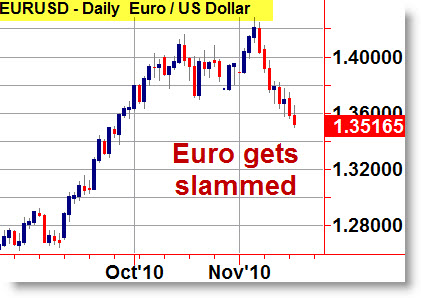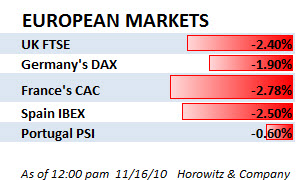In a recent post, we discussed some of our basic rationale for avoiding Europe as a core investment as well as our concerns about the Euro. Now as Ireland continues to unravel and there are worries that Greece will not make any great strides in reducing their budget.
Earlier today, we saw headlines that provided for the continued drop in the Euro as infighting amongst the region’s countries are heating up. From sources:
Austria has refused to pay its December tranche for the $110 bln Greek bailout as it is concerned by reports out of Greece that it would miss its target for its government deficit reduction. The amount Austria has to pay for December is EUR 190 mln. The country has been under political fire ever since it released its 2011 budget and yesterdays news out of Greece is likely what finally drove Austria to make this announcement. Austrian finance minister Josef Proll stated, ‘”From the current set of data we have there is no reason to release the December tranche from an Austrian perspective,”‘
Yesterday, Greece said that it would not hit its 2010 deficit target of 8.1%, with the figure coming in closer to 9.4%. Yesterday, Greece announced that it had hidden approx EUR 5.3 bln of debt from officials by using off-market swaps. Recall this was heavily rumored at the beginning of the year with Goldman Sachs at the middle of the controversy. The swaps were executed between 2001-07 but it would appear that they are finally coming onto the books and thus driving some of the Greek debt figures higher.
Austria is not the first country to pull its support from the bailout as Slovakia announced back in August that it would do the same thing. This flew under most radars as the European sovereign debt concerns had quieted down and were not so prevalent as they are now. In terms of Greek exposure European banks have approx 80% with French banks at 25%, Swiss banks at 20%, German Banks at 15%, US banks at 5%, and UK banks at 3%.
With the confusion floating around about the Irish Banks, European markets were hit hard today.
Even if there is a bailout of the Irish Banks or a monetary injection to help the banks, then we have to look back again toward Greece. Then Portugal and so on.
Here is the bottom line: Government officials in Europe have been masters at obfuscation and misleading all through a series of inaccurate assessments and political follies. While the Irish Prime Minister says there is no need for funding, he is willing to talk about a bailout to calm markets. The Greek PM is also a magician when it comes to misleading information regarding his countries fiscal condition.
Yesterday, Greece said that it would not hit its 2010 deficit target of 8.1%, with the figure coming in closer to 9.4%. Yesterday, Greece announced that it had hidden approx EUR 5.3 bln of debt from officials by using off-market swaps. Recall this was heavily rumored at the beginning of the year with Goldman Sachs at the middle of the controversy. The swaps were executed between 2001-07 but it would appear that they are finally coming onto the books and thus driving some of the Greek debt figures higher.
Austria is not the first country to pull its support from the bailout as Slovakia announced back in August that it would do the same thing. This flew under most radars as the European sovereign debt concerns had quieted down and were not so prevalent as they are now. In terms of Greek exposure European banks have approx 80% with French banks at 25%, Swiss banks at 20%, German Banks at 15%, US banks at 5%, and UK banks at 3%.


















